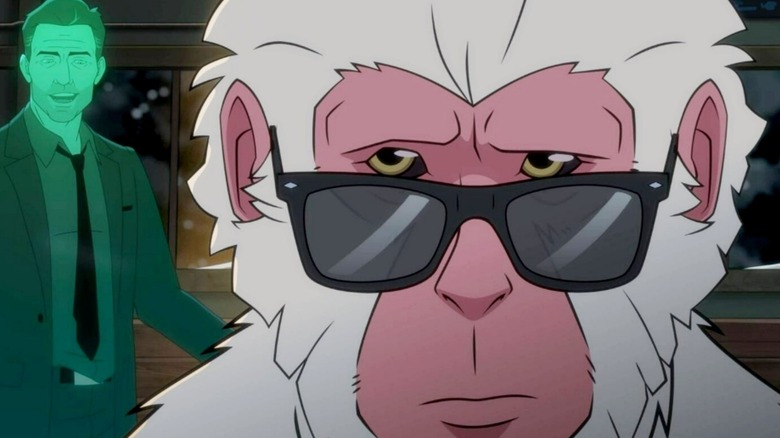
These past few years have been tremendously busy for rapidly rising composer Daniel Rojas.
Between Netflix's "Kipo and the Age of Wonderbeasts" and the Hulu/Marvel one-two punch of "M.O.D.O.K." and "Hit-Monkey," Rojas has made the transition from commercials and short films to major feature films (he contributed to the soundtrack of 2015's Brie Larson-starring "Room," 2016's "Money Monster" and the Alexander Payne film "Downsizing" in 2017) and name-brand shows look impossibly easy.
That's not to say that it actually was easy, of course, or that Rojas himself takes any of these accomplishments for granted. Far from it. Born in Costa Rica to a family of talented musicians, music -- and particularly the drive to broaden his horizons as much as possible -- has always been an integral aspect of his life. Needless to say, this passion paid off in a big way as he eventually made his way Stateside, graduated from the esteemed music program at the University of North Texas, and ended up in the very composer-friendly confines of Los Angeles.
"Hit-Monkey" first came to life as a 2010 digital comic series from writer Daniel Way and artists Dalibor Talajic and Dave Johnson. The Hulu series, which laudably encourages viewers to check out the source material at the end of every episode, is both comedically dark and surprisingly earnest as it follows the Japan-set adventures of a remorseless and insufferable hitman named Bryce (Jason Sudeikis) who dies, reanimates as a ghost, and finds himself cosmically chained to an intelligent monkey (voiced by Fred Tatasciore) now burdened to pick up his quest for revenge. The wacky premise is ... a lot to take in, but it's also a vital part of the show's charm. This also made Rojas' composing duties equal parts challenging and immensely fulfilling at the same time.
Hot on the heels of this past weekend's premiere of Marvel's "Hit-Monkey," I had the pleasure to chat with Rojas. Throughout the course of our conversation, we went in-depth on all sorts of topics: from his fascinating career path to this point, to the gloriously nerdy details of his technical approach in scoring "Hit-Monkey," to his insightful perspective on the industry at large.
'I Do Hope I'm Just Getting Started.'
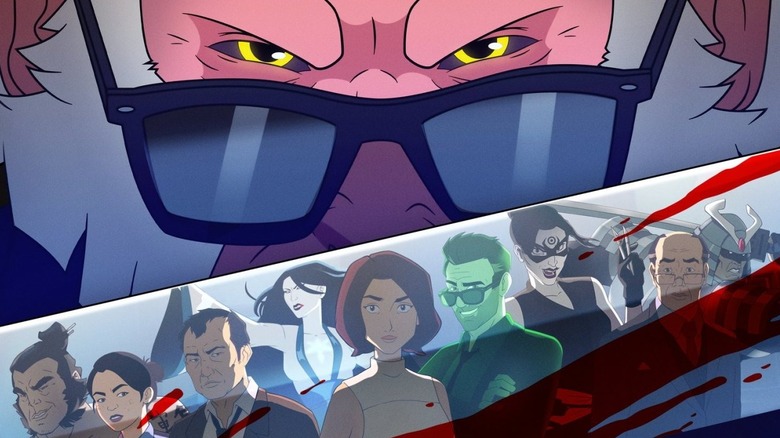
First of all, congratulations are in order between "Kipo," "M.O.D.O.K." and now "Hit-Monkey." Would you say this -- the past couple of years -- have been the biggest, busiest, most fulfilling of your professional career so far?
For sure. Yes. I've been in LA for quite a little while. I mean, I got here about 12 years ago and started working for other people and kind of finding my way up. But yeah, for sure, the past two to three years, once I got "Kipo," have been the busiest and most fruitful.
I mean, I do hope I'm just getting started. I wish for a very long career and the people I looked up to have had really long careers too in general, like other composers. So obviously, I do look at it as, this is kind of the beginning of it, hopefully, but I'm grateful that it's been, so far, the better. Because how it is in this industry, the beginnings can be pretty rough. And for several years, it was pretty unstable for me. So it's nice that I have now a good stream of work.
Growing up, could you have possibly envisioned this [career] back then?
Honestly, no. It's a little bit surreal. I mean, I did dream to work in the film music industry since I was fairly small because my parents, as you've mentioned here, they're musicians and they're orchestral musicians. So I was aware of film music because the orchestra is, even in Costa Rica sometimes, would put a film music night every once in a while, like once a year or something. And that was always my favorite. I like classical music, but whenever it was time for "Indiana Jones" and all these things, that was when I was the happiest, even just in the audience.
So I always liked it a lot, but, of course, coming from Costa Rica, it felt, I really had no clue how to even get started. Nothing. I didn't know anyone. So to be here now, it's definitely a little bit surreal and I still celebrate even the small things, because it feels like, the other day I was added to the Marvel music playlist on Spotify. And it's just crazy to see some of my music in there next to Alan Silvestri and all these other guys, people that I've looked up to since I was 10 or 12 years old. So it's pretty cool.
Not to say that I'm at that level, of course. I just mean, being on the same playlist is enough of an honor.
'A Little Luck Factor'
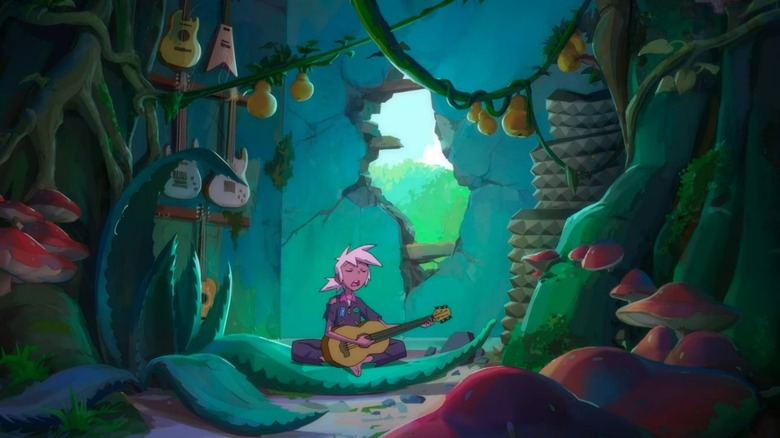
So you carved out your own little niche here on shows about a burrow girl in a post-apocalyptic future ("Kipo and the Age of Wonderbeasts"), one of Marvel's craziest super villains that they have out there ("M.O.D.O.K."), and a hitman/monkey bent on revenge ("Hit-Monkey"). Do you intentionally seek out these sorts of outside-the-box, unconventional ideas, or did it just kind of happen that way?
I mean, I would say it's a mix.
I got lucky with "Kipo," because... "Kipo" was my first, let's say, bigger show, like my first studio show... So "Kipo" did happen a little bit as a surprise, that it was something that I loved so much. I wasn't really sure what I was getting into, because it was a very secretive project. So I pitched for it, I did some demos, but I didn't really learn about the project and the characters until I was already hired. So that's why I say there's a little luck factor in there because as I was finding out more, I was like, "Wow, this is actually really cool. I really dig this."
The other ones after have partly been related to that because the music supervisors from "Kipo" were Kier Lehman and James Cartwright, who were the ones working on "M.O.D.O.K." and especially "Hit-Monkey." So it's kind of been related. But why I say that it has been also intentional, I've tried ... to keep my time for the projects that I really connect to. So I've been having to say some no's, which is never easy, especially if you come from many years of saying yes to everything. But right now, I'm trying to be more selective and trying to carve my career in a way that I can showcase what I want to do. Because I have had opportunities through the other projects, but I'm afraid they would take too much time and concentration and bandwidth, basically.
So yeah, it's a mix, I would say. There's some luck in it in the sense that I didn't fully select each project, but I've been selective also as things have picked up to be like, "Okay, this one I do. This one, I won't," to try to keep my career a little centered into something that I like.
Do you flex different composing muscles depending on if it's live action, if it's in movies, it's a short, or these TV shows?
Yes. Yeah, for sure. I think a lot of it has a through line, even from commercials. You know, a lot of the technical aspects of it is similar. You know, like the software that you have to use and the musical knowledge and things like that. But all of those that you mentioned are quite different in the way that the story arcs are. Like when you're doing a short film or even a trailer or something like that, the story is way smaller and you can just kind of start and end very quickly. In something like a film, you still have a story arc that is much longer. So there's more space for you to develop things. And a TV show is very open because as you know, nowadays, TV shows get renewed and you don't even know if it will get renewed or not, but you have to plant the seeds just in case it is.
So a lot of times, you have to see through the future or ask the writers or creators, "This character, is that going to be important?" Because maybe on this season, you only see that character a couple times, but maybe that's a huge character for season two or three, if they were to happen. So I need to know those things for it to be cohesive. In "Kipo," for example, that happened quite a bit where we planted seeds for characters that we knew were going to come back later, so that we can... when people see season one, now they'll be like, "Oh wow, that character didn't come until season three, but I can hear his theme on season one." And that's kind of cool. It feels intentional.
So I think that's more of the muscle that I've had to adapt depending on what it is, if it's a short or a feature or a TV show, but the musical and technical aspect itself, it's shared, I would say.
'The Number One Priority Would Be To Serve The Story'
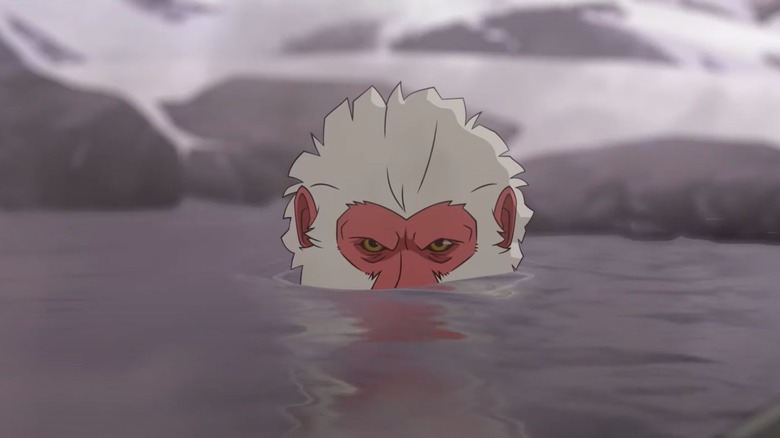
Do you personally put an emphasis, priority number one, on placing recurring motifs on characters, locations, even specific moods and feelings?
I wouldn't say priority number one, because I think the number one priority would be to serve the story. If there's no space for you to put your themes, then I wouldn't force it... So I think the priority number one would be to make sure that the music helps the scene and that it's doing its job. But I would say, musically, it would be quite a priority to try to make things make sense. So thematic material, it really helps in that sense.
But as you probably, you sound like a good film scoring fan, so as I'm sure you know, themes nowadays tend to be shorter. It's more about motifs or sound design. And I love a long theme, but having the space to do something like a "Superman" theme from the eighties is very rare. It happens, but only happens in certain movies, maybe "Shazam!" or something like that. But in most TV shows, more modern movies, the majority, it's more about little short motifs or little rhythmic things or things like that, that kind of become signatures for that.
And I've thought about it, because I love a long theme like everyone else. But nowadays, it's kind of, everything switches so quickly. And the style of editing is so much about shortcuts and going from here to there and keeping the people in their toes, that having a motif that can be shorter and recalled very quickly is quite useful. So some of those things ... I do have some themes that are longer because I enjoy it, but I always try to have versions that can be really short, that I can just kind of sprinkle in different places very quickly, and just get my point across in a way.
Have you noticed, is that becoming somewhat of a lost art, do you think, these kinds of exaggerated themes or is it just the natural...?
Progression of things? I think it might come back, you know? I think it's like fashion and many things in general, like how those big jeans or whatever were cool in the seventies ... They kind of came back when I was in high school for a bit, but people throw them and now I see sometimes young people having them again.
So it's some of those things. I think once a couple of really good movies make sweeping orchestral themes again, it might become a thing again, because people will be like, "Oh, sounds like Hollywood." I think we're still going through a period where a lot of filmmakers want to stay away from that. So you kind of have to ... Because a lot of composers I know love that stuff. It's our background. So we like it, but it's not really what's current. It's not what filmmakers necessarily want at the moment. Everybody's very into sound design and kind of complimenting the sound with the image much more than the notes themselves.
But I think it's a trend. I think in a few years, we'll come back to it for a while and then it'll go away again. Who knows?
'An Ode To Anime'
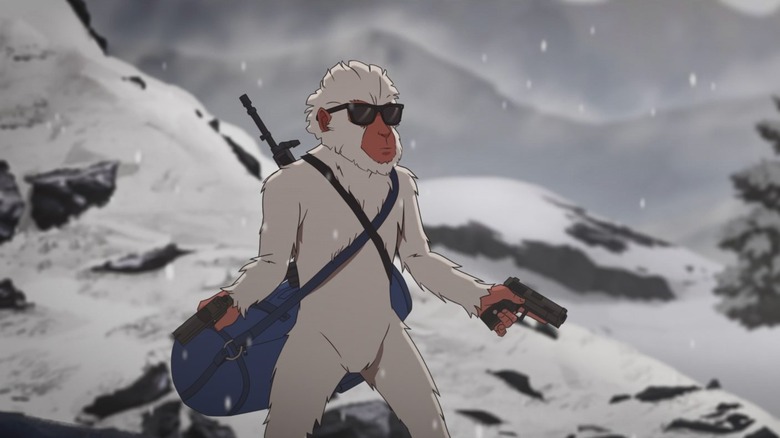
Moving on to "Hit-Monkey" specifically: musically speaking, how do you even begin to approach capturing that dynamic of, again, a ghost of a hitman and a monkey that's shooting guns and stuff?
I mean, it was definitely a challenge at the beginning to try to find the sound of the show. I do have to give some credit to Kier and James, the music supervisors. They had already selected some of the songs and we had even some of the temp music in there that, just to kind of give some ideas. At least we knew what worked better and what definitely didn't work. Which is what is useful sometimes of temping and just trying things. It's not only to find something that you like, but to discard and not waste time on things that you're like, "Okay, this definitely doesn't work. It doesn't help the comedy or it doesn't help the pacing. So we're not going to do something like that." And that's really helpful too.
But there was quite a bit of experimenting and I feel like the project switched a little bit from its inception. When we first started talking about it, we thought a little more rock and roll because of the type of character and the sunglasses, and he feels like that. Even in my head, I would hear British rock, Sex Pistols type of thing. It's kind of how he looks, but that sound is difficult to compliment so much dialogue and all the things that Bryce is saying, commentary and there's a lot of comedy, and that wouldn't come across with that type of sound.
So we had to kind of merge it. And there's still some of that. That's why there's some electric guitars and some grungy sounds in there, but a lot of it ended up being a little more catered to the fact that we needed to stay away from the dialogue, we needed to have "hits" here and there. So that would be kind of the ... how we found ourselves in this pocket of really hybrid world that has some darker undertones, but also a good amount of comedy and kind of tickers and pacing kind of things, with a rock and roll attitude, I would say.
There's one very early moment when Bryce is on the bullet train in the very first episode. That piano piece, that composition, it's so different from everything else that we've even heard before and after that moment in the series, and then it recurs once more in the very final episode. Was that juxtaposition...?
Yes. That was very intentional. And that was something that actually came more from trying to do that bit of an ode to anime in a way. So with a different type of piano, because the anime in the eighties and things like that, sometimes they have like these solo piano pieces that are very melancholic and they have this kind of sad, but happy feeling in the same way.
And we wanted to kind of take some of that, but the piano sounds back then were really clean and kind of ... I didn't think they fit so well today. It felt a little out of place. So we modernized it with a sound that's a little more what we call "felt piano," that is open and has like more ... you can hear the hammers and stuff, but the composition itself has that kind of melancholy to kind of make you think of an older TV show or something like that. So that was kind of the approach, but you're totally right. They're very different to most of the score.
There's one more moment, I think it's in episode seven, when Monkey gets hurt and Bryce is claiming for him or whatever. That has also that kind of world as well. But those are the only three moments that I can think of that have that sound specifically. It's more like a one-off.
'More Comic Book ... With A Japanese Flavor'
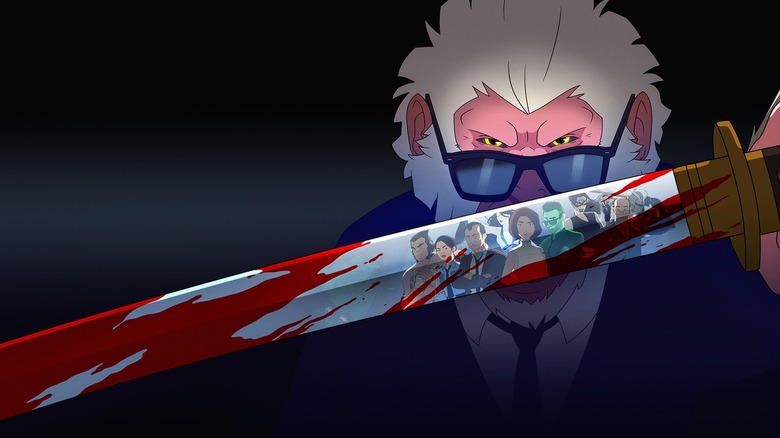
I'm sure you've heard this cliché before, that the setting of a show or a movie, it's like its own main character almost. So with "Hit-Monkey," I feel like it's sort of in between. It's not as heightened as "Kipo," but it's obviously not exactly our own Tokyo, for instance. So what effect does that have on your approach?
That's a great question, actually, and that's something we talked about. Because it's all in Japan and I mean majority in Tokyo, but then also in the outside, by the mountains and stuff, we knew we wanted to bring some of that. But we were also wary to not overdo it. We didn't want the score to just sound Japanese and be really over the top, because then it could come off kind of strange and distracting. And also already with a lot of the actors being Japanese and/or Asian, and they had a bit of an accent and the accent was also intentional in some areas, we didn't want the music to add to that and make it look ... you have to be careful nowadays. [laughs]
I think we wanted to bring that balance. I'm half Chinese, actually, so I'm Asian as well. And I've really loved that music. So I wanted to bring some of those things and I brought quite a bit of koto and other Japanese instruments in there, but in a fairly mild way. So some of the cues do definitely feel like they have that influence, which you probably noticed, but in general, I would say we maybe put, I don't know, 20% of it or something like that. We could have gone a lot more Japanese, but we wanted to make it feel more general, more comic book, international in a way, with a Japanese flavor.
But the setting definitely affect a lot, whether we are in Tokyo or we are outside. And if you noticed, a lot of times when we're in the mountains and stuff, the music is definitely bigger. It's more sweeping, kind of, more strings and --
Orchestral.
Exactly. Orchestral, finger drums and things like that. And as we're in the city, it's more synth-based, a little more artificial, more edgy because it's the city and we wanted those sounds that's full of neon and things like that. So that felt ... I would say that's a through line. You're not going to hear so many analog scenes and crazy sound design when we're in the mountains, as you would when we're in the middle of underground Tokyo, and then you won't hear those nice strings and koto as much in the city as you would when we got outside. So that was kind of the concept, I think.
'It Was Quite A Few Different Genres Inside A Single Show'
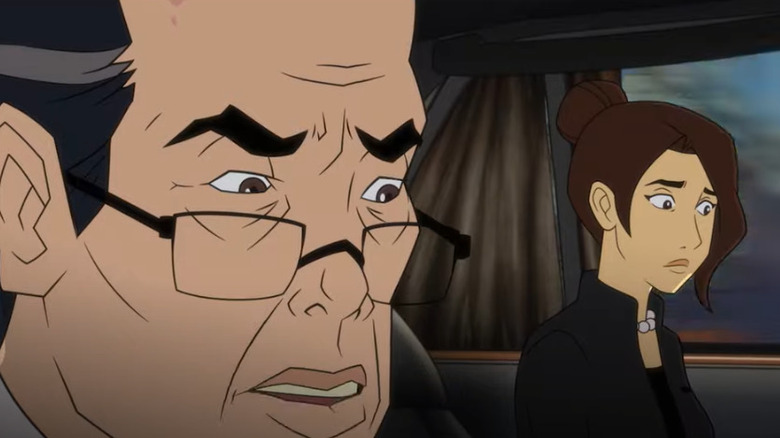
In addition to that setting, you have a full range of different tones and even genres in this one show. You have the political drama. You have the underworld crime ... and then there's even a little bit of the romantic comedy going on between Monkey and Akiko early on. How do you balance bringing all of those different elements into one cohesive whole?
Yes. That was definitely a challenge on this show to try to touch in all of those and help the transitions to smooth it out. But you're totally right, that's all different. And I think the music definitely also feels different. Some cues, I try to keep it all in a way that is cohesive. But if you take out of our soundtrack, there's a cue called "Press Conference," for example, which is that political type of sound. And that's very orchestral. It sounds almost like the Daily Planet, something like an old Superman comic in a way or something like that.
But then we have, there's another one called "We Are Running," which is also a part of that political ... all of that had those bigger sweeping strings and a little more of a classic sound, whereas the new, more underground Japan, like I said, the crime story was a little more gritty and had a little more, yeah, aggressive synths and think dark undertones on there.
And like you said, there's that whole other aspect that is a little more either romantic or even, there's a bit of a bromance too, between Bryce and Monkey. And that definitely had a little more sweet type of score, piano strings and things like that to try to compliment that. But yeah, you're totally right. It was quite a few different genres inside a single show. And I think that shows in the music too. The score does have quite a few different genres, but since the sound is all produced with the same instruments and a lot of those things, then there is a bit of a through line in there, but there's definitely different music from something like, yeah, the more action scenes in the city versus the more political aspects of it.
Do you prefer how... that's kind of a subtle thing. People might not necessarily notice that, most viewers maybe not even register that consciously.
I think I like to be more on the understated side. As long as people love the show and if people think the show really worked, I'm happy with that. Of course it's nice when people reach out or listen to the soundtrack, but that's not as much of a priority to me. I think that's more of a priority when I'm doing songs. On "Kipo," for example ... I had original songs. And those songs, I definitely want to make them a statement. I want people to remember those and people to like hum them and go and download them and all that.
But when it's not a song on the score side, I like to be kind of understated. I like to not call so much attention, unless it's a scene that it really feels like, okay, this is made for me to really go all out there. So I enjoy those opportunities. But in general, I try to be pretty subdued. Just let the story go. And then when I have my few moments, just cherish those.
'I'm More Team John Legend'
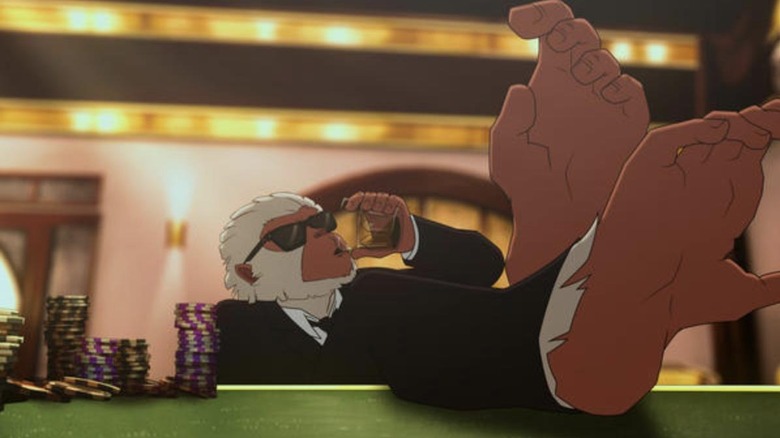
So what's next on your plate? Is there anything you can share?
The next few weeks are not so crazy because "Kipo," "M.O.D.O.K.," "Hit-Monkey," and a couple other things that I did were all in a row. So I haven't had a big break in a little while. So I'm taking a little time to update my studio, update my computer, all these things that need to be done every once in a while.
I'm starting a feature film that is live action, but I can't share yet what it is, because you know how it is, but it's a live action feature film. It's kind of a dramedy. So it's very different to the things that I've been doing and it's for one of these streaming platforms. So it'll be there, I think probably either in the summer or fall of next year, but we are going to be scoring it up until about April, I think.
And then after that, I'm going to be starting a show, the ... again, I can't say very much, but it's going to be on Nickelodeon and Paramount Plus. I think I can share that, which is my first time working with them. So I'm excited about that, but it's with some people I've already worked with before.
So yeah, that's what's on my plate for next year as of now and the rest, yeah, I would probably ... Like I said, I'm trying to be a little selective, just picking projects that speak to me and things that I feel are moving my career in a direction that I want. So I do have a bit of time if something like that comes up and I'm trying to demo for some things, but as of now, I don't have a ton fully on my schedule, but it's also the end of the year. So things really warm up usually when we come back in January.
Okay. So my final question for you. This is going to be completely out of the left field, but "La La Land" ... with your jazz expertise, the central question of that movie, there's a sort of "modern jazz versus traditional jazz" debate kind of going on ... What was your personal takeaway from the movie?
That's a very interesting question. [laughs] I actually, I don't know if you saw maybe on my bio, but I have a jazz background myself. I went to school for jazz studies in North Texas. I think I'm more of, in that sense, I'm a little more team John Legend personally.
I feel like jazz is an extremely rich art form and that's why I studied it and I still admire it so much, but I am of the team that I feel like, that music happened for a reason and our job, more than just replicating and being extremely purist about it, I feel like our generation can just take that and move it somewhere else. So I would say I'm more of that team, although I do think it's necessary to keep the tradition. So I admire musicians that are so meticulous about maintaining the art of Coltrane and Charlie Parker alive. And I think that there's a big value about that just as there's a value in museums showing art by Monnet and all these things. I think there's a value in tradition and safekeeping of that.
But in general, and for myself, I'm more team John Legend in the sense that I want to modernize things and make it more accessible to people. And I think as musicians, I'm of the mindset, I'm not just writing music for myself. I know that there's a school of people that say, you should just do everything for yourself. I like to do things for people as well. I get gratification by seeing people enjoy the projects I'm working with, whether it is a film or a TV show or just a music album. I like that. I like to share it. I like to see people enjoying the music. So part of what I do, I try to always keep it in mind. I'm doing this for other people too. So that's kind of my mindset.
"Hit-Monkey" is available now on Hulu.
Read this next: The 14 Best Animated Movies (That Aren't Made By Disney Or Pixar)
The post Hit-Monkey Composer Daniel Rojas on Music Themes, Industry Trends, and La La Land [Interview] appeared first on /Film.
0 Comments